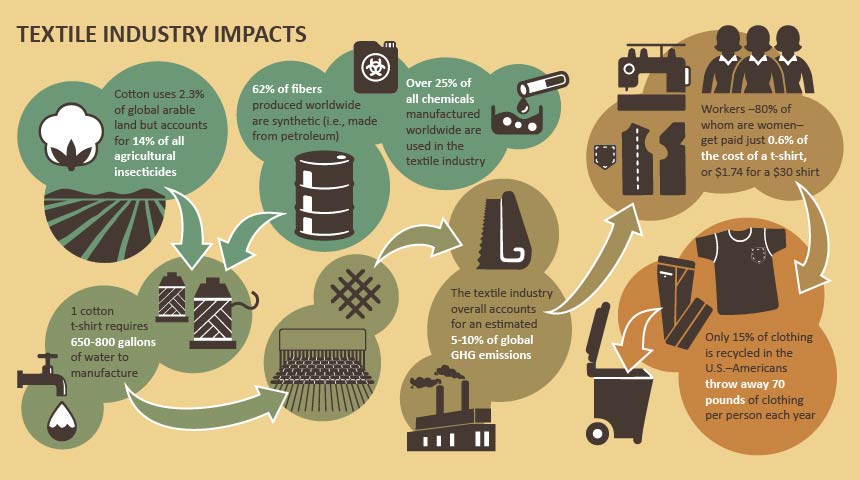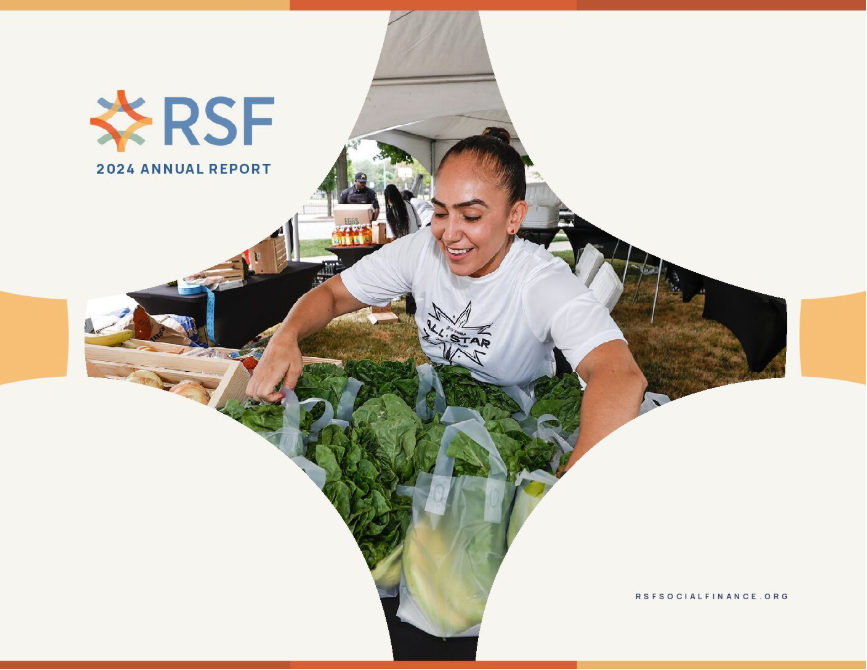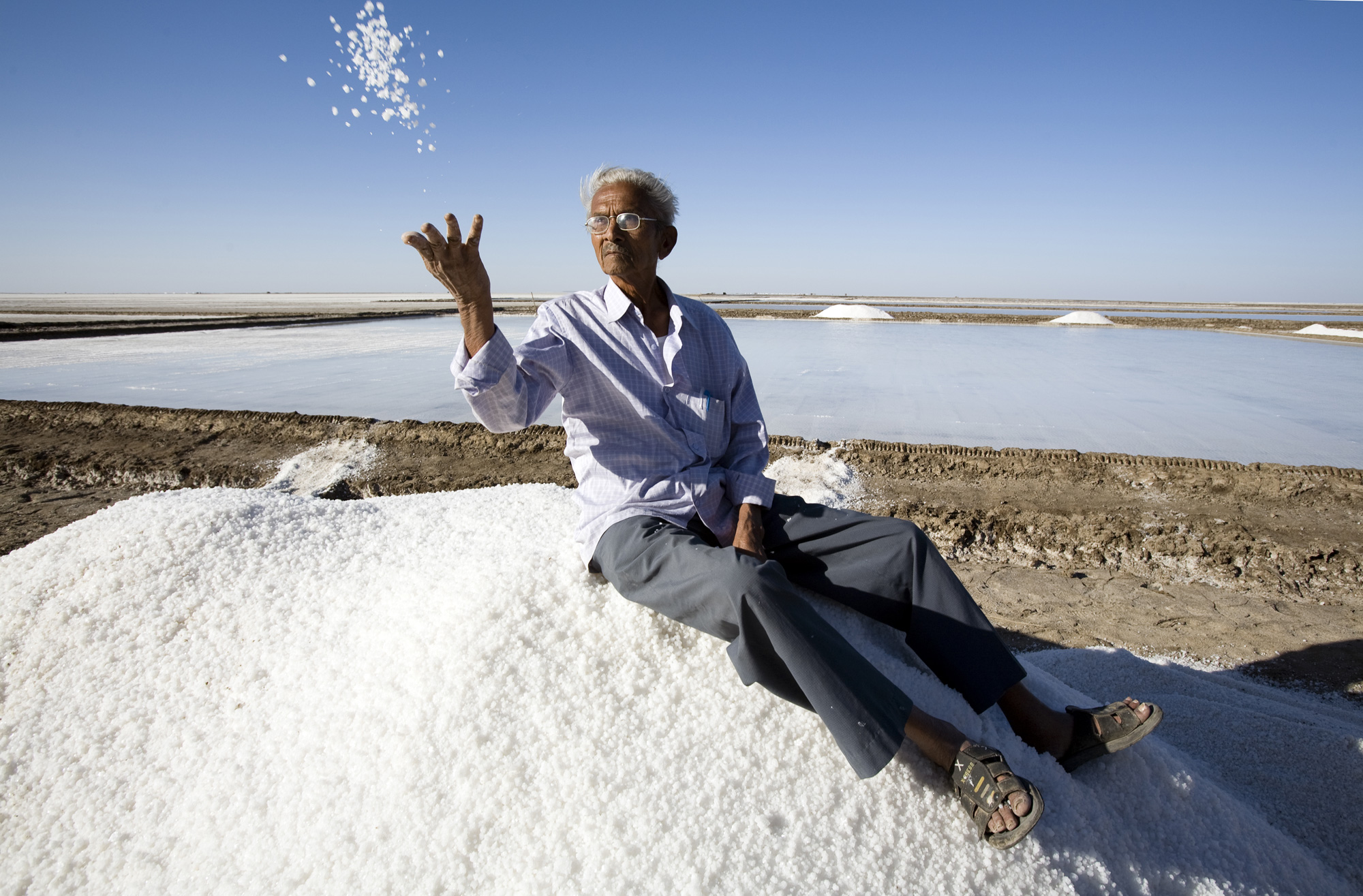Just a little over two years ago, I asked my colleague Celina Adams if she would talk with me about an innovative new program she was participating in—the RSF Integrated Capital Institute (ICI).
At the time, I had embarked on a long-held vision to focus my work on issues of environmental and social justice in the global textile industry. I was pursuing this goal in initial ways through my previous role as Senior Program Officer at Island Foundation, supporting grants to inspiring nonprofits like Fibershed and its local affiliate and working to raise funder awareness through a white paper and webinars. But I could see that grantmaking approaches alone were insufficient to address the challenges of the textile industry’s infrastructure-intensive supply chain. I knew I needed new tools for moving capital to support reform, but I couldn’t quite name them—until I encountered the new ICI program.
I wrote my RSF application specifically focusing on my work in the fiber and textile sector, sharing my goal to help coordinate and accelerate the efforts of U.S. funders and investors to drive change in this sector.
Fast forward: In November 2018, I left the Northeast winter behind and stepped into the golden light of Paicines Ranch for the first ICI intensive. How could I know that within a year, my family would have moved, I would have left my job and started my own consulting business, and I would be fully focused on my goal through a new Special Project on Sustainable Fiber and Textiles, housed at the national funder network Sustainable Agriculture and Food Systems Funders (SAFSF)?
Maybe the real question is: with the power and belief of my 23 fellow Fellows and the incredible ICI team behind me, how could I not have known that change would be afoot?
In my new role, I’m focused every day on the ICI goal of moving capital to solve systemic problems. For years, the global textile and apparel industry got a pass, glossed over as frivolous “fashion,” as investors directed increasing scrutiny at other extractive industries like oil and gas. But textile products surround all of us every day—mattresses, sheets, towels, home and office furnishings, and of course our clothing. And this industry is no bit player—it has an estimated value of $900 billion, projected to grow to around $1.2 trillion by between 2025-2027.[1] (For rough comparison, the global smartphone market declined 3% to an estimated $522 billion in 2018.)
While reliable statistics for this industry can be hard to come by, the infographic below shows some of the other impacts of this extractive global supply chain. (Full sources here and here).

As these impacts become clearer, a host of global compacts and consortia have emerged as apparel brands try to work together to develop more sustainable fibers, less polluting practices, and fairer labor standards. However, as the World Resources Institute highlights, the industry still fundamentally operates on a “take-make-waste” business model focused on selling more products to more people each year. Without a fundamental shift in this model, highly visible commitments like the Fashion Industry Charter for Climate Action, with a target of 30% GHG emissions reduction by 2030, run the risk of encountering the same business-as-usual inertia that has plagued national climate efforts.
What is less visible, but in my opinion, infinitely more hopeful, is the resurgence of U.S.-based, mid-scale, regenerative fiber and textile farms and businesses that are rooted in the land and communities. These businesses focus on plant-based fibers like cotton, flax, and hemp, and animal-derived products like wool, alpaca, and leather—critical parts of the U.S. and global agriculture system and key crops for millions of farmers. They aim to fill what our Advisor and RSF ally Scott Leonard of Indigenous Designs calls “the missing middle” of the supply chain. This concept connects closely to a body of work on Agriculture of the Middle and to inspiring food supply chain businesses like Red Tomato and Veritable Vegetable.
A small number of visionary funders have begun investing in these innovative fiber supply chain projects—including 11th Hour Project, Jena and Michael King Foundation, Patagonia, and an RSF Donor-Advised Fund. In conversations with these partners, they emphasized the need for data and case studies to tell the story of emerging work in the U.S. fiber and textile sector and make the case for further funding and investment.
Incubated in the focused exploration of the RSF Fellowship, these ideas put us on the path to our current project: Values-based Investing and Integrated Capital Strategies in Sustainable Textiles: A Roadmap For U.S. Growth And Opportunity – known as the “Textiles Roadmap” for short. With partners Jenny O’Connor (ICI Cohort 3!) and Calla Rose Ostrander, we are working to deliver a five- to seven-year vision for integrated capital opportunities in regional textile processing and manufacturing infrastructure, including investment in education and human skills. Throughout the Roadmap, we are prioritizing climate mitigation and equity as critical criteria, drawing on a Just Transition framework.
We were honored to assemble our stellar Advisory Committee of experts on investing and textiles. And we are grateful to have received support from an RSF Donor-Advised Fund and the 11th Hour Project to help us embark on the work.
The heart of the project is a series of in-depth interviews with four key groups: Farmers and ranchers raising fiber crops; fiber processing businesses and workers along the supply chain; apparel brands and other potential buyers; and funders and investors. These inspiring conversations have already revealed examples of potentially transformative investments, including:
- Immediate expansion capital needs for one of the country’s few vegetable leather tanneries, in response to growing demand from regenerative graziers seeking to profit from their hides as well as their meat;
- A North Carolina training center’s idea for a small-scale $100K fund to support fiber system entrepreneurs’ prototyping with U.S.-grown fibers;
- Equipment capital needs for a several Midwest tribes working to develop Native-owned hemp manufacturing;
- Opportunities for a Northeast alpaca fiber processor to modernize supply chain management and encourage regenerative land management practices among its 4500 alpaca farm suppliers;
- Groundbreaking work by a California textile mill to reconnect a local and climate beneficial wool supply chain; and
- Early-stage research support for a cooperative group of African-American farmers in the Southeast to increase hemp production and processing for fiber use.
Looking ahead, we’ll present early findings and case studies from the Textiles Roadmap at the April Croatan Forum in Durham, North Carolina (thanks to fellow ICI Fellow David LeZaks), and we’ll share the full Textiles Roadmap at the June 2020 SAFSF Forum in Kansas City, Missouri.
Beyond the release, we are actively planning for Phase 2 of this project. With our Advisors helping us think big, we envision options that could include:
- Developing an incubator/accelerator for U.S. textile businesses;
- Launching an integrated capital fund to support these efforts;
- Serving as a navigator or matchmaker for textile supply chain businesses and interested investors; and/or
- Developing a public markets strategy to help activist investors shift dollars away from extractive global fashion conglomerates.
These ideas, as you may be able to tell by now, are inspired by the ICI experience and by absorbing RSF’s pioneering way of thinking about the role of capital in driving systems change. I draw inspiration as well from my Board role at New England Grassroots Environment Fund, where a participatory grantmaking model has revolutionized the kinds of efforts receiving funding. What would it look like to develop an Investment and grant review committee that elevates the voices of farmers and garment workers in determining how best to revitalize our U.S. textile industry?
The RSF fellowship application asks applicants how they would like future generations to remember their work. I wrote, “I hope I will have helped spark the same kind of awareness that the food movement has created—a system where we no longer go along as blind ‘consumers,’ but ask critical questions about where the textile products that surround us every day come from, who made them, and how those humans are treated.”
Through the radical shifts that the ICI fellowship catalyzed in my life, I have the chance each day to learn from others who are asking and answering those critical questions. I welcome your questions as well—every interview uncovers a web of regional opportunities for leveraging capital, and we welcome opportunities to work with interested funders, investors, and family offices to deepen the work. Together we can help make this sector a contributor to RSF’s goal of an economy that works for people and planet.
[1] Data is a composite from three market research reports from the firms Grand View Research, Mordor Intelligence, and ResearchandMarkets.com.
Sarah Kelley is the Principal of Common Threads Consulting. She currently serves as Project Director/Consultant for a Special Project on Sustainable Fibers and Textiles, is a Board member at New England Grassroots Environment Fund, and an Advisory Council for New Standard Institute. Sarah served for 10 years as Senior Program Officer at the Island Foundation. She was a 2018-2019 RSF Integrated Capital Fellow.


